选修7 Module5 Ethnic culture 完整教案
高中英语 Module 5 Ethnic Culture教案选修7

Module 5 Ethnic Culture 【美文阅读】中国的民族文化丰富多彩。
剪纸是最贴近我们生活的一种,你会剪纸吗?你想利用剪纸表达什么呢?Papercutting is a traditional art in China which has gradually developed throughout the long history of paper.Papercutting is all made by hand.It is easy to learn the rudiments(基础,基本知识;初步,入门).Papercutting covers nearly all topics,from flowers,birds,animals,legendary(传说的,传奇的) people,figures in classic novels,to types of facial makeup in Beijing Opera.Papercutting has various styles in different parts of China.We can give best wishes to our friends and relatives through papercuttings.Furthermore,it can make the world beautiful in our life.In a word,papercutting is a good art in China.【诱思导学】1.What's papercutting?_______________________________________________2.What do pe ople want to express using their papercuttings?_______________________________________________【答案】 1.Papercutting is a traditional art in China which has gradually developed throughout the long history of paper.2.People can give best wishes to their friends and relatives and make the world beautiful in their life.Period ⅠPreviewing(教师用书独具)●教学目标本课时主要是学生通过对学案所给出的内容的学习,了解本课文中所出现的词汇,初步了解课文以及相关的背景知识,为下一堂课对课文的全面理解起到一个铺垫作用。
最新外研版高中英语选修7《module 5 ethnic culture》introduction教案.doc
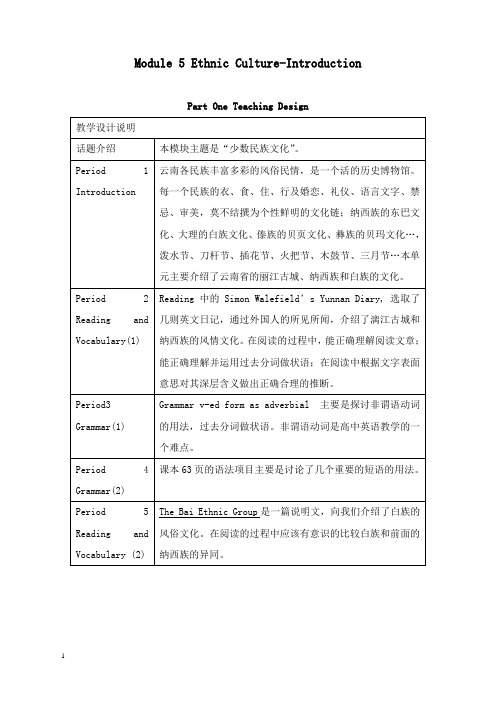
Module 5 Ethnic Culture-Introduction Part One Teaching DesignPeriod 1 Introduction■Goals●To learn something about the Yunnan Province●To master the new words in the introduction●To practise talking about ethnic culture■ProceduresStep 1: Warming up by a discussionIn this module, we will talk about ethnic culture. As we all know, there are so many minorities, for example, the province of Yunnan is one home to many ethnic minorities. How much do you know about Yunnan Province?“Yunnan” this word refers to “the South of Clouds”, it sounds beautiful and it is really a beautiful place. Let me tell you something about this wonderful land.Yunnan, located in the Southwest China, has a vast territory, magnificent mountains and rivers, and abundant natural resources. With an area of 390,000 square kilometers, Yunnan is the eighth largest province in China. It is an inland province, with Guizhou Province and Guangxi Zhuang Autonomous Region in the east, Tibet Autonomous Region in the northwest, and the Qinghai-Tibet Plateau in the southwest. Outside China, Yunnan borders on Burma in the west; Vietnam and Laos in the south. With a long borderline, is the main passageway connecting China with the Southeast Asian nations.In Yunnan, there are more than 6000 rivers which belong to 6 river-systems and 37 lakes with an area of over 1 square kilometer can be seen here, boasting a large number of plateau lakes. For example, the Dianchi Lake was called the bright pearl of Plateau. There are 700 hot springs as well, all of which attract lots of friends all over the world.According to our Chinese culture, a perfect place should consist of both the waterscape and the mountain. Yunnan’s mountains are also famous, including the Yulong Xueshan Mountain in Lijiang, which was regarded as one of the key scenic spots at state level. The mountains and rivers in Yunnan are both very superb landscape.Besides the landscape here, the climate in Yunnan is pleasant. As we all know Kunming is called the Spring City that’s because it’s always warm as in spring. The feature of Yunnan Climate is that it has little difference in the seasonal temperature but considerable difference of temperature in a day. In general, the weather is favorable throughout the year, cool in summer and warm in winter, which makes Yunnan a favorable resort all the year round.Step 2: Reading the information in the boxOpen your textbooks, and turn to page 57. Let’s look at Activity 1. Work in pairs. Say what you know about the province of Yunnan. Use the words in the box and the fact file to help you.Name Yunnan(meaning beautiful clouds in the south)Location most south-western provinceGeography everything from mountains and lakes to rainforestsSize 394,000 square kilometersPopulation about 42 million in 2003Read through the words in the box together and repeat them chorally and individually.Read through the fact file individually and try to understand everything. Now boys and girls, do it please.Step 3: Describing what the Dai girl is wearing in the picture.Rare animalsgolden monkey, Asian elephant Plantshome to half of all China ’s plant species People home to 25 ethnic minorities, most diverse region ofChinaCapital cityKunming Naturalwonders Stone Forest, Tiger Leaping Gorge, first bend of Yangtze River。
英语:Module 5《Ethnic Culture》英文教案

Module 5《Ethnic Culture》I.教学内容分析本模块以少数民族的文化为话题,介绍了我国云南省境内纳西族和白族的风情文化以及北美和澳大利亚的土著文化。
通过本模块学习,学生要学会写介绍有关少数民族的文章。
Introduction部分通过学习和复习一些描述少数民族风情、服装和地理位置等信息的词汇,学会简介云南省及其境内少数民族的概况,为本模块的学习奠定基础。
Reading and V ocabulary(1)部分选取了西蒙•韦克菲尔德的四则英文日记,通过一位外国朋友在云南旅游的所见所闻,介绍了丽江古城以及纳西族的风情文化。
让学生完成相关词汇的练习;学会归纳文章的主旨大意;并围绕文章内容,进行听、说、读、写等各项活动。
Grammar(1)部分通过观察课文中的例句,要求学生掌握过去分词短语作状语及其与状语从句的转换。
Speaking部分是阅读课文后所展开的一项活动,要求学生总结从阅读课文汲取的有关丽江和纳西族人的信息,展开讨论,在口头表达中熟练运用虚拟语气。
Listening and V ocabulary部分听取一段关于西双版纳、泼水节的对话,培养学生准确获取有效信息、完成相关练习的能力。
Grammar(2)部分的短语来自Listening and V ocabulary,让学生通过回顾录音内容,正确理解短语的意义,然后通过练习进一步巩固。
Everyday English部分选取听力材料中和主题文段相关的常见的和典型的英语习惯用语组成对话,通过补全对话的形式使学生熟练掌握这几个表达。
Speaking and Function 部分通过复习听力材料中的短语,要求学生正确运用常见的表示询问更多信息的口语表达法。
Reading and V ocabulary(2)部分是一篇介绍白族文化的文章,通过快速阅读,培养学生捕捉重点信息,把握细节信息的能力,并为本模块的写作做好铺垫。
Writing 部分通过阅读课文中提供的有关信息,模仿Reading and Vocabulary(2)有关描写白族文化的写作结构,写一篇介绍少数民族—基诺族的文章。
《Module5 Ethnic Culture》教学设计

《Module5 Ethnic Culture》教学设计一、教材内容课题名称:外研版高中英语Book7 Module5:Reading and V ocabulary(1)。
教材依据:外语教学与研究出版社高中英语选修7第五模块:Module5: Ethnic Culture第二课时:Reading and vocabulary(1):Simon Wakefield’s Yunnan Diary二、设计思想1、本课的教学指导思想:以学生为主体,“授学生以渔”。
教学过程中注重学生之间的交流与合作。
提高学生的阅读水平,教会学生发现问题、分析问题和解决问题的能力。
以课文内容为基础,开展听、说、读、写等活动。
2、设计理念:充分、灵活地利用现代信息技术—多媒体进行教学,突出英语学科特色,以丰富多彩的画面结合课文内容进一步开展听、说、读、写等活动。
以小组为单位,开展竞赛,复习所学知识;重点训练学生的阅读技巧;对课文里出现的独立主格结构和强调句型进行重点讲述,和学生一起对近几年高考题型中涉及到的这两种结构进行分析并解答;指导学生去发现问题,并和学生一起去解决问题,进一步培养学生分析问题和解决问题的能力;本节课结束,学生对本节课表现进行自我评价。
通过本课的学习,进一步提高学生的阅读水平,学会跳读和查读,锻炼分析问题、解决问题的能力。
3、教材分析:外研版高中英语第七册第五模块“Ethnic Culture”《民族文化》。
本模块以少数民族的文化为话题,介绍了我国云南省境内少数民族纳西族和白族的风情文化以及北美和澳大利亚的土著文化。
通过本模块学习,学生要学会写介绍有关少数民族的文章。
本节课Reading and V ocabulary(1)(阅读和词汇1)是本模块的第二课时,介绍云南丽江古城。
文章部分选取了一位外国朋友Simon Wakefield(西蒙•韦克菲尔德)的四则英文日记,通过西蒙•韦克菲尔德在云南旅游的所见所闻,介绍了丽江古城以及纳西族的风情文化。
外研版选修七-Module 5 Ethnic Culture -教案设计
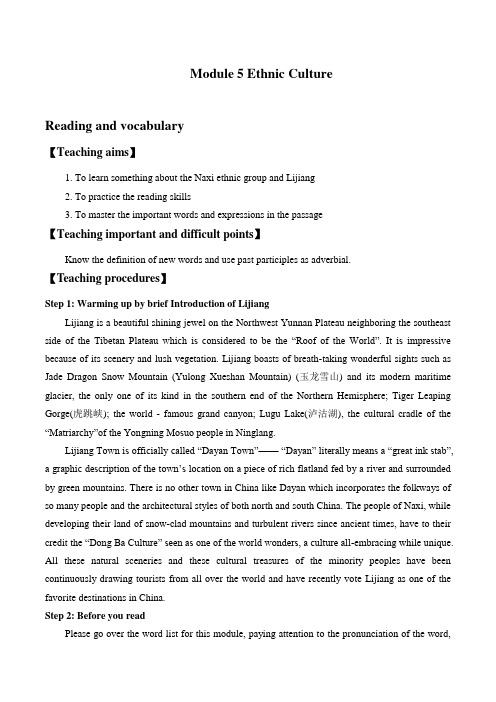
Module 5 Ethnic CultureReading and vocabulary【Teaching aims】1. To learn something about the Naxi ethnic group and Lijiang2. To practice the reading skills3. To master the important words and expressions in the passage【Teaching important and difficult points】Know the definition of new words and use past participles as adverbial.【Teaching procedures】Step 1: Warming up by brief Introduction of LijiangLijiang is a beautiful shining jewel on the Northwest Yunnan Plateau neighboring the southeast s ide of the Tibetan Plateau which is considered to be the “Roof of the World”. It is impressive because of its scenery and lush vegetation. Lijiang boasts of breath-taking wonderful sights such as Jade Dragon Snow Mountain (Yulong Xueshan Mountain) (玉龙雪山) and its modern maritime glacier, the only one of its kind in the southern end of the Northern Hemisphere; Tiger Leaping Gorge(虎跳峡); the world - famous grand canyon; Lugu Lake(泸沽湖), the cultural cradle of the “Matriarchy”of the Yongning Mosuo people in Ningl ang.Lijiang Town is officially called “Dayan Town”——“Dayan” literally means a “great ink stab”, a graphic description of the town’s location on a piece of rich flatland fed by a river and surrounded by green mountains. There is no other town in China like Dayan which incorporates the folkways of so many people and the architectural styles of both north and south China. The people of Naxi, while developing their land of snow-clad mountains and turbulent rivers since ancient times, have to their credit the “Dong Ba Culture” seen as one of the world wonders, a culture all-embracing while unique. All these natural sceneries and these cultural treasures of the minority peoples have been continuously drawing tourists from all over the world and have recently vote Lijiang as one of the favorite destinations in China.Step 2: Before you readPlease go over the word list for this module, paying attention to the pronunciation of the word,the relationship between its pronunciation and its spelling.Step 3: While you read1. Now read the text loudly please. While you are reading the passage, please underline the new words and phrases and pay attention to the usage of them.Step 4: After you readNext let us do the exercisesFind words in the passage which mean:1) a type of writing that uses pictures2) to be born from an egg3) something, you can’t forget4) many, small streets that are easy to get lost in5) a man who is polite and behaves well6) including many different kinds of things7) controlAnswer the questions:1) In what way is the Yunnan landscape varied?2) Why do tourists get lost in Lijiang?3) In what way are Naxi women unusual?4) What is unusual about the Naxi language?5) How do the Naxi believe their people started?6) Why is Naxi music famous?Choose the correct answers1. The old town Lijiang is _____.(a) on the side of Yulong Xueshan Mountain (b) opposite Yulong Xueshan Mountain (c) covered with snow2. Naxi women ______.(a) used to inherit all property (b) inherit all property (c) have always inherited property3. The old man who Simon met ______.(a) had made translations of Naxi poems (b) read Naxi poems to Simon (c) was very lively4. The Naxi language ________.(a) is still spoken today (b) is not spoken any more (c) is almost 1,000 years today5. The Naxi men who played in the orchestra ______.(a) were all very old (b) played instruments that sounded sad (c) played music that had not changed for centuries6. Simon now realizes that ______.(a) people are equal (b) we are all very different (c) love and friendship are very。
Module 5 Ethnic Culture 教案
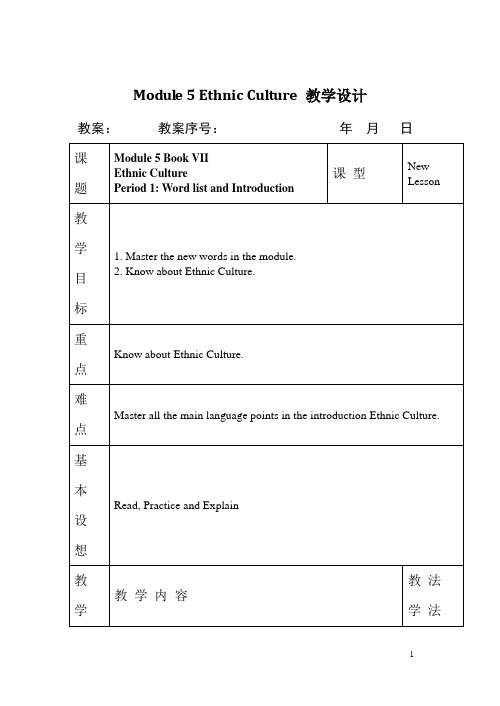
教 法 学 法
Step 2
6
2. Why do tourists get lost in Lijiang? 3. In what way are Naxi women unusual? 4. What is unusual about the Naxi language? 5. How do the Naxi believe their people started? 6. Why is Naxi music famous? 7. In what way does Simon say that people are all the same? Step 3 Reading and vocabulary 1. Pair work: Discuss the text of Reading and vocabulary 2. Ask the students to read the passages and find out the main ideas of each passage. 3. Ask the students to finish the Ex 3 and 4 in the textbook by themselves. 4. Check their answers. Step 4 Main language points: 1. minority Talking and Reading
2. Master the main language points in the text.
重 点 Main language points in the text. 难 点 Main language points in the text. 基 本
Practising and Explaining
Module_5_Ethnic_Culture_教学设计

第七册 Module 5 Ethnic Culture 阅读课教学设计田静单元寄语:1.本模块在教材的地位:本节教学内容是外语教学与研究出版社出版的(英语选修7)第1版第5模块Ethnic Culture 中的阅读Simon Wakefield’s Yunnan Diary.我们都知道外国人对于我国的文化相当的痴迷,而我们很多国人又恰恰对于我国的文化意识相当淡薄,云南,四季景致怡人,从不缺蓝天,白云与绿草。
她秀丽的风景延绵玉龙雪山和丽江,高耸入云的石林,罕见的稀有动植物,美丽的西双版纳让我们也展开畅想的翅膀,去体验一下这个美丽的多民族融合的,充满无限生命力的神秘地方吧!所以这一模块的设置很有必要,从本模块来说它既是基本语言内容,又为本模块的知识扩展和综合语言运用能力奠定坚实的基础。
因此,上好本模块的内容,能够培养学生的文化意识,激发学生对民族文化的热爱;既可让知识学习具有一定的延续性,又可为下面的教学做好铺垫,对今后的英语教学具有重要意义。
2.本节课的内容分析:本单元Reading主题是少数民族风土文化,通过一位外国人日记中的所见所想,介绍了丽江古城以及纳西族的风情文化,结构清晰,主题明确。
除了对必知的地理位置,自然风光描述之外,还对云南的特色,丽江古城,纳西妇女和纳西音乐和语言等进行了简洁的描绘。
最后点出了作者的感受:无论起初我们看上去有多么的不同,然而我们本质上是一样的,每个人都是平等的。
本单元Reading的阅读宗旨是,通过阅读,让学生了解有关云南的自然地理和人文知识,培养文化意识,促进文化交流。
正如新课程标准中的教学建议所提:学习民族文化有利于“拓展学生的文化视野,发展他们跨文化交际的意识和能力。
”通过这个课时的教学任务使学生对少数民族文化有一定的认识,并最终树立各族团结,协作,和谐共处的意识。
旅游作为当今社会人们最感兴趣的话题在英语学习中占有非常重要的位置。
所以少数民族文化作为旅游的一个重要组成部分在本模块有所渗透也是一个非常贴近生活,具有时代性,可挖掘性的教学主题。
高二英语外研版选修7教案:Module5 EthnicCulture 3
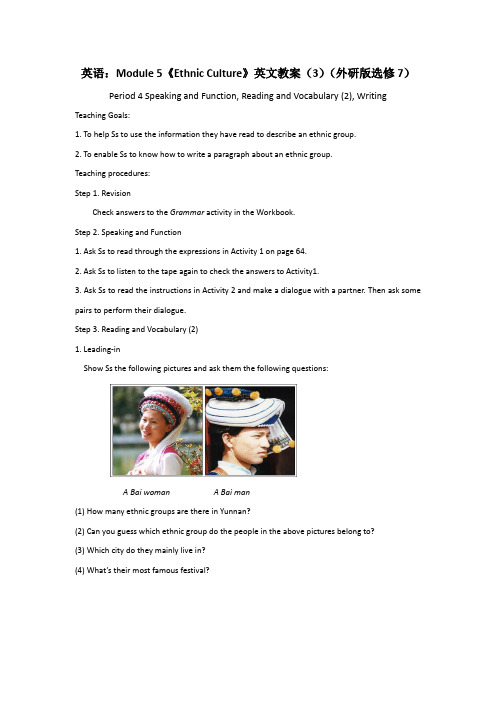
英语:Module 5《Ethnic Culture》英文教案(3)(外研版选修7)Period 4 Speaking and Function, Reading and Vocabulary (2), Writing Teaching Goals:1. To help Ss to use the information they have read to describe an ethnic group.2. To enable Ss to know how to write a paragraph about an ethnic group.Teaching procedures:Step 1. RevisionCheck answers to the Grammar activity in the Workbook.Step 2. Speaking and Function1. Ask Ss to read through the expressions in Activity 1 on page 64.2. Ask Ss to listen to the tape again to check the answers to Activity1.3. Ask Ss to read the instructions in Activity 2 and make a dialogue with a partner. Then ask some pairs to perform their dialogue.Step 3. Reading and Vocabulary (2)1. Leading-inShow Ss the following pictures and ask them the following questions:A Bai woman A Bai man(1) How many ethnic groups are there in Yunnan?(2) Can you guess which ethnic group do the people in the above pictures belong to?(3) Which city do they mainly live in?(4) What’s their most famous festival?(Dali Beauty)The Bai Torch Festival(held on June 25th of Chinese lunar calendar)2. Fast readingAsk Ss to read the text quickly and do Activity 1 on Page 66, then check the answers.3. Intensive reading(1) Ask Ss to read the text carefully. Then let them fill in the following form and discuss the answers.Suggested Answers:(2) Ask Ss to read through the words in the box in Activity 2.4. ExplanationExplain the main points in the text to make sure Ss understand the text better.(1) The Bai ethnic group has a population of around two million, 90% of whom live in Yunnan.白族大约有两百万人口,百分之九十居住在云南。
高二英语外研版选修7 module 5 Ethnic Culture reading 教案

高二英语外研版选修7 module 5 Ethnic Culture reading教案高二外研版选修七Module5 Reading 教学设计教材分析:这是一篇日记,文章结构很清楚,主要介绍了云南丽江的美景和纳西文化。
学生对云南的美景很是向往,对少数民族的文化也很感兴趣,所以设计了图片吸引学生,激发他们的学习兴趣。
最后安排了做导游这个口语交际活动,使学生了解了云南,懂得了尊重少数民族文化。
Teaching aims: 1.To know more about Yunnan through studying2. To improve the students’ reading ability3. 掌握完全倒装和独立主格结构以及过去分词做状语4. To love ethnic culture and our beautiful country5. To improve the students’ ability of communication in English through performingImportant points:1.Improving the students’ reading ability2.Respecting ethnic culture and loving our beautiful country Difficult point:独立主格结构, introducing Yunnan in EnglishTeaching tool:multimediaTeaching process:Leading in:展示中国地图讨论自己喜欢的旅游胜地,引入云南的优美风光话题【设计说明】栩栩如生的图片让学生欣赏到云南的优美风光,使学生急切地想知道课文当中是怎样介绍云南的,为课文的学习做好铺垫.Reading:Step1: 词。
高二英语外研版选修7教案:Module5 EthnicCulture 4
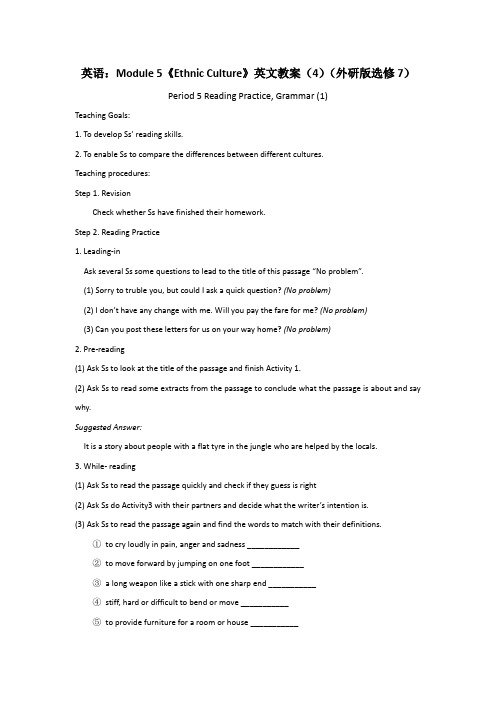
英语:Module 5《Ethnic Culture》英文教案(4)(外研版选修7)Period 5 Reading Practice, Grammar (1)Teaching Goals:1. To develop Ss’ reading skills.2. To enable Ss to compare the differences between different cultures.Teaching procedures:Step 1. RevisionCheck whether Ss have finished their homework.Step 2. Reading Practice1. Leading-inAsk several Ss some questions to lead to the title of this passage “No problem”.(1) Sorry to truble you, but could I ask a quick question? (No problem)(2) I don’t have any change with me. Will you pay the fare for me? (No problem)(3) Can you post these letters for us on your way home? (No problem)2. Pre-reading(1) Ask Ss to look at the title of the passage and finish Activity 1.(2) Ask Ss to read some extracts from the passage to conclude what the passage is about and say why.Suggested Answer:It is a story about people with a flat tyre in the jungle who are helped by the locals.3. While- reading(1) Ask Ss to read the passage quickly and check if they guess is right(2) Ask Ss do Activity3 with their partners and decide what the writer’s intention is.(3) Ask Ss to read the passage again and find the words to match with their definitions.①to cry loudly in pain, anger and sadness ____________②to move forward by jumping on one foot ____________③ a long weapon like a stick with one sharp end ___________④stiff, hard or difficult to bend or move ___________⑤to provide furniture for a room or house ___________⑥a woman whose husband has died and who has not married again _________⑦not comfortable, relaxed or confident __________⑧to make a hole in something _________Suggested Answer:①howl ②hop ③spear ④rigid ⑤furnish ⑥widow ⑦awkward ⑧pierce(4) Ask Ss to read the passage again to find the information and write them down with key words:Suggested Answer:(5) Ask Ss do retell the story with the key words above.(6) Ask Ss to do Activitities 4~5 individually, then check the answers with a partner.4. Language PointsExplain some language points to Ss.(1) In the distance was an ox working in a field. (P67, lines2-3, para3 )在远处,一头牛在田里劳作。
高二英语外研版选修7教案:Module5 EthnicCulture 5
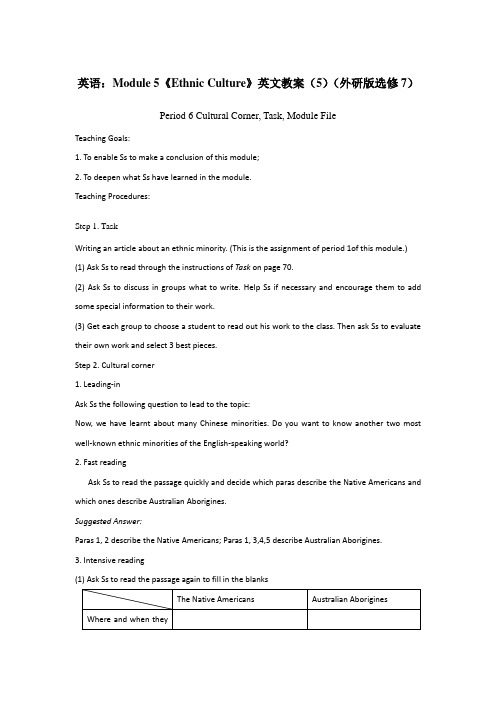
英语:Module 5《Ethnic Culture》英文教案(5)(外研版选修7)Period 6 Cultural Corner, Task, Module FileTeaching Goals:1. To enable Ss to make a conclusion of this module;2. To deepen what Ss have learned in the module.Teaching Procedures:Step 1. TaskWriting an article about an ethnic minority. (This is the assignment of period 1of this module.)(1) Ask Ss to read through the instructions of Task on page 70.(2) Ask Ss to discuss in groups what to write. Help Ss if necessary and encourage them to add some special information to their work.(3) Get each group to choose a student to read out his work to the class. Then ask Ss to evaluate their own work and select 3 best pieces.Step 2. Cultural corner1. Leading-inAsk Ss the following question to lead to the topic:Now, we have learnt about many Chinese minorities. Do you want to know another two most well-known ethnic minorities of the English-speaking world?2. Fast readingAsk Ss to read the passage quickly and decide which paras describe the Native Americans and which ones describe Australian Aborigines.Suggested Answer:Paras 1, 2 describe the Native Americans; Paras 1, 3,4,5 describe Australian Aborigines.3. Intensive reading(1) Ask Ss to read the passage again to fill in the blanksSuggested Answer:4. SpeakingAsk Ss to discuss the similarities between The Native Americans and Australian Aborigines. (Get Ss to refer to the box above )Suggested Answer:They both from Asia. Both groups were hunting gatherers. The populations of both groups decreased after the arrival of western colonists.Step 2. Module FilePurpose: To enable Ss to make a conclusion of this module and deepen what they have learned in the module.Ask Ss to look at Module File on page 70 and try to recall what they have learnt in the module. Then tick the things they are sure that they know and put a question mark next to the points they are not sure of and a cross to what they don’t know.Help Ss to share their ideas and deal with the difficult or confusing points.Step 4. Homework1. Ask Ss to finish the rest of the exercises in the Workbook of this module.2. Ask Ss preview module 6.。
高二英语外研版选修7教案:Module5 EthnicCulture 2
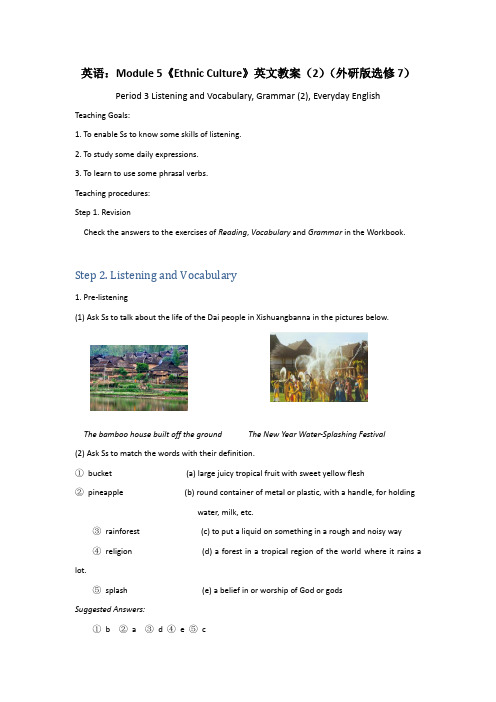
英语:Module 5《Ethnic Culture》英文教案(2)(外研版选修7)Period 3 Listening and Vocabulary, Grammar (2), Everyday English Teaching Goals:1. To enable Ss to know some skills of listening.2. To study some daily expressions.3. To learn to use some phrasal verbs.Teaching procedures:Step 1. RevisionCheck the answers to the exercises of Reading, Vocabulary and Grammar in the Workbook.Step 2. Listening and Vocabulary1. Pre-listening(1) Ask Ss to talk about the life of the Dai people in Xishuangbanna in the pictures below.The bamboo house built off the ground The New Year Water-Splashing Festival(2) Ask Ss to match the words with their definition.①bucket (a) large juicy tropical fruit with sweet yellow flesh②pineapple (b) round container of metal or plastic, with a handle, for holdingwater, milk, etc.③rainforest (c) to put a liquid on something in a rough and noisy way④religion (d) a forest in a tropical region of the world where it rains a lot.⑤splash (e) a belief in or worship of God or godsSuggested Answers:① b ② a ③ d ④e ⑤ c(3) Ask Ss to do Activity 1 on page 62 and check the answers in pairs.2. While-listening(1) Ask Ss to listen to the tape and number the topics given in Activity 2 in the order they are mentioned.(2) Ask Ss to listen to the tape again and pay attention to the detail. Then ask them to choose the correct answers to Activity 3 on page 62.(3) Ask Ss to listen to the tape a third time and fill in the missing words.Jacky: Is Xishuangbanna as wonderful as every one says it is?Simon: Yes, It’s amazing. The thing is, it’s still very undeveloped- you know, it’s got mountains, rice fields, little villages deep in tropical rainforests…Jacky: It sounds beautiful.Simon: It is. It’s also got all kinds of flowers and animals- tiger, elephants…Jacky: Did you see any?Simon: (laughing) I didn’t ①any tigers, but I did see some wild elephants.Jacky: Amazing! ②Simon: There are a lot of different ethnic groups, but the Dai people ③one-third of the population.Jacky: Oh yes, the Dai people. I’ve ④them. Tell me something about them.Simon: Well, their language is similar to the Thai language. That’s not surprising since Xishuangbannan shares a border with Thailand.Jacky: Do they still wear traditional costume?Simon: Yes, a lot of them do. ⑤, they think it’s more attractive than modern clothes. I think it is too, actually. It’s very colorful. The men wear white or blue trousers, and the women wear brightly-colored blouses and skirts with silver belts. In fact, I bought one of the belts for my girlfriend. ⑥, do you think she’ll like it?Jacky: Oh, that’s very pretty. She’ll adore it. So, ⑦about your trip. ⑧.Simon: Well, ⑨the thing that’s most different is the houses, which are made of bamboo and built off the ground.Jacky: Ah, so the people live…Simon: They live above the ground, and they keep pigs and chickens in the area beneath thehouse.Jacky: Sounds like a good idea.Simon: It’s very picturesque. They grow fruit all round their houses- pineapples, for example. A Dai family ⑩in their house for a week. It was a great experience and surprisingly comfortable. We were in a village called Ganlanba, about an hour away from Jinghong. Jacky: I’m (11) ! But (12) _?Simon: No, because the wind blows through the bamboo, so it’s always quite cool. Actually, we were lucky enough to be there for the Water-Splashing Festival.Jacky: Is that a New Year Festival?Simon: Yes. People carry round buckets of water and splash it all around them, and every one gets very wet. The water’s supposed to wash away the old year and bring in the new. The wetter you get, the more luck you’ll receive, so they say. I got so wet, I had to change all my clothes! Twice!Jacky: (13) the food?Simon: It can be very good. There’s a kind of black rice dish that’s quite (14) ! And at a lot of the restaurants there’s traditional dancing, with Dai women playing on large elephant drums. It can be quite hard to hear yourself speak!Jacky: I’d love to go there.Simon: Well, I’m definitely going back next year. I really (15) the place. Why don’t you come with me?Jacky: Maybe I will. I’ll (16) . It does sound very lovely.Suggested Answers:①come across ②What are the local people like? ③make up ④heard of⑤Apparently ⑥What do you reckon ⑦go on ⑧I’m fascinated ⑨I guess⑩put us up (11) green with envy (12) doesn’t it get very hot in summer(13) What about (14) tasty (15) fell for (16) think it overStep 3. Grammar (2)1. Ask Ss to work in pairs to do activity 1 on Page 63 and check the answers.2. Ask Ss to make sentences with these phrasal verbs.3. Ask Ss to do Activity 2 then discuss with their partners.Step 4. Everyday English1. Ask Ss to read through the words and phrases in the box in Everyday English and make sure of their meanings..2. Ask Ss to finish the activities individually, and then check the answers.3. Ask Ss to read the dialogue with a partner.Step 6. Homework1.Ask Ss to preview The Bai Ethnic Group on page 65.2. Ask Ss to do the Grammar activities in the Workbook.。
外研版高中英语选修7《Module 5 Ethnic Culture》(Reading and Vocabulary)word教案(2)
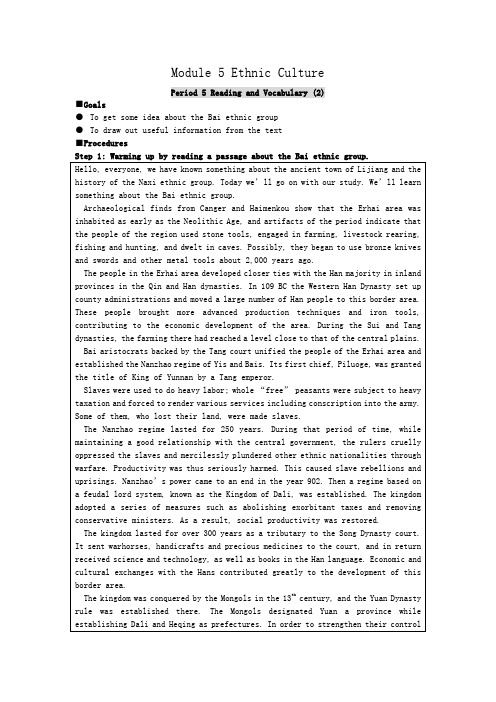
Period 5Readingand Vocabulary (2)
■
●To get some idea about the Bai ethnic group
●To draw out useful information from the text
■Procedures
The Nanzhao regime lasted for 250 years. During that period of time, while maintaining a good relationship with the central government, the rulers cruelly oppressed the slaves and mercilessly plundered other ethnic nationalities through warfare. Productivity was thus seriously harmed. This caused slave rebellions and uprisings. Nanzhao’s power came to an end in the year 902. Then a regime based on a feudal lord system, known as theKingdomofDali, was established. The kingdom adopted a series of measures such as abolishing exorbitant taxes and removing conservative ministers. As a result, social productivity was restored.
最新外研版高中英语选修7《module 5 ethnic culture》grammar2教案.doc

Module 5 Ethnic Culture-GrammarPeriod 4 Grammar (2) -- phrasal verbs■Goals●To learn the usage of some phrasal verbs■ProceduresStep 1: General introductionThe grammar items in this unit focus on phrasal verbs. You will learn that a phrasal verb is made up of a verb plus an adverb or a preposition. You will also learn some rules to use phrasal verbs. You are expected to apply what you have learnt to practical use by finishing a conversation and a word game. Step 2: Explanation:1. Look at the following sentences. Compare them and tell the part of speech of each underlined word.He looked around and saw nothing.She is looking after the old lady carefully.In the two sentences, around is an adverb while after is a preposition.She was so ill that it seemed unlikely that she would pull through.He has gone through a difficult time recently.Here the first through is an adverb while the second through is a preposition. So we know an adverb or a preposition is used to make up a phrasal verb.2. Try to understand the meaning of the phrasal verb ‘make out’. Many phrasal verbs have more than one meaning. Do you know the meanings of the phrasal verbs in the following sentences?1) His accent gives him away as a southerner.2) He gave away most of his money to charity.3) They gave away their last chance of winning the match.4) The mayor gave away the prizes at the school sports day.5) She took me in completely with her story.6) He was homeless, so we took him in.7) Fish take in oxygen through their gills.8) I hope you’re taking in what I’m saying.9) S he pays the bills by taking in washing.Step 3: Match the phrasal verbs with their meanings1. I didn’t come across any tigers….2. ….the Dai people make up one third of the population.3. Oh, yes, the Dai people, I’ve heard of them.4. So go on about your trip.5. A Dai family put us up in their home for a week.6. I really fell for the place.7. I’ll think it over.(a) fall in love with(b) meet or find, when you are not expecting it(c) continue(d) let someone stay in your home(e) consider(f) be a certain part of something(g) know aboutStep 4: Complete the sentences with the phrasal verbs in Activity 11. If you _____ a good book on Yunnan when you’re in the bookshop, can you buy it for me?2. I’ll ____ your suggestions but I’m not sure I agree with them.3. A friend of mine went to Yunnan and ____ a Dai woman. They’re married now.4. I know a lot about the Dai people but I’ve never _____ that custom.5. An old man offered to ___ us ____ in his house.6. Non-Han people ____ nearly 30% of Yunnan’s population.7. I’m so interested in what you’re saying. Please _____.。
Module 5《Ethnic Culture》Introduction教案1(外研版选修7)

A teaching plan for “Ethnic Culture-Introduction”章节:Module5 Ethnic Culture-Introduction授课年级:高二使用教材:外研版选修七主要教学方法:CLT&TBLT 课的类型:新课教具:多媒体粉笔Teaching aims:Ⅰ.To help the students master the new words in introduction and reading&vocabulary.Ⅱ.To help the students learn something about the Y unnan Province.Ⅲ.To help the students practice talking about the ethnic culture.Difficult & important points:Enable the students to talk about the ethnic culture in Yunnan.Teaching procedures:ⅠLead in:In last module, module4, we have learned some types of music which were born in America. After learning something about abroad, let’s focus on our own culture. So today let’s move on to the next module, module5-Ethnic Culture. Now let’s focus on the new words and expressions.ⅡExplain the new words and expressions:Read the words twice following the teacher.1.ethnic: 种族的,民族的ethnic food , ethnic costume2.minority: a. 少数(尤指投票者或票数)Only a minority of British households do/does not have a car. 英国只有少数家庭没有汽车。
外研版高中英语选修七海政学校Module 5Ethnic Culture教案外研社选修七

张全利内容page 58 Reading and vocabulary课型任务阅读课多媒体电教课知识目的:1.learn the key words in the passage.2.learn some useful phrases and structures了解,理解重点单词,词组和句型能力目的:1.improve the ability of reading comprehension, fast readingCareful reading, and further comprehension提高阅读方面的各种能力,快速,细节理解和深层理解情感目标:了解不同的民族,尤其是云南的风景和文化,热爱祖国的丰富的民族文化。
教学过程:1.激情导入。
利用我国的民族多和多姿多彩的节日导入云南这个主题2.通过云南丰富的地貌和珍稀动植物唤起学生去云南的渴望3.正式进入阅读本文“Simon Wakefield’s Yunnan Diary”速读,培养宏观把握文章的能力4.查读带着文章中的问题读,根据需要调整阅读速度5.细读对文章深层次的理解在阅读过程中根据文字表面意思对其深层含义作出正确合理的推断6.重点句型理解7.朗读课文,强化理解和读说的能力8讨论通过本课,了解中国的云南,理解民族文化,热爱祖国的美丽山河,保护不同的文化遗产9.家庭作业。
完成有关课文的填空,朗读课文板书设计:重点单词,词组❖varied❖canal❖cobbled❖run❖inherit❖property❖be astonished by wake up to❖get lost in run through❖have the custom of doing sth in use❖put together put a spell on教学反思:适当缩短导入的内容,以便给后面的内容增加时间,较好完成教学任务。
Module 5 Ethnic Culture 教学设计-优质公开课-外研版选修7精品

Module 5 Ethnic Culture 教学设计一、题材内容与学习目的本模块的主题是少数民族文化。
阅读课文选取了几则英文日记,通过一位外国人的所见所思,介绍了丽江古城以及纳西族的风情文化。
要求学生掌握相关词汇,培养听、说、读、写等语言技能。
二、语言知识目标1. 词汇(1)单词minority n. diverse adj. native adj. belt n.varied adj. run vt. & vi. custom n. apron n.hatch vi. pineapple n. crop n. opera n.farm vi. fish vi. hammer n. foolish adj.lame adj. tyre n. firm adj. jungle n.soul n. ox n. spear n. garment n.sleeve n. necklace n. jewellery n. arch n.rigid adj. framework n. fasten vt. loose adj.fibre n. corn n. spade n. tool n.chick n. rooster n. fold vt. adjust vi.furnish vt. mat n. teapot n. bare adj.waist n. widow n. nephew n. garage n.awkward adj. rainbow n.(2)短语in use have a population ofin the distance set off2. 语法过去分词作状语。
过去分词作状语时可以表示时间、原因、条件、让步、方式或伴随情况等。
例如:Seen from a distance,XiShan Hills resemble a sleeping woman.Spoken by fewer and fewer people these days,the Naxi language may disappear in the future.Give more time, we would have done it better.When were home, exhausted.When visited in spring, the hills are covered with flowers.Once recovered, he began to work at once.The girl is very shy, and never speaks until spoken to.Apples remain fresh if kept in the refrigerator.功能询问更多信息。
- 1、下载文档前请自行甄别文档内容的完整性,平台不提供额外的编辑、内容补充、找答案等附加服务。
- 2、"仅部分预览"的文档,不可在线预览部分如存在完整性等问题,可反馈申请退款(可完整预览的文档不适用该条件!)。
- 3、如文档侵犯您的权益,请联系客服反馈,我们会尽快为您处理(人工客服工作时间:9:00-18:30)。
MODULE FIVE一、课标词汇minority, rainforest, diverse, native, bright-coloured, belt, varied, run, property, custom ,apron , hatch ,pineapple , apparently , crop , opera, farm,fish ,hammer ,foolish , lame , tyre , firm , jungle , soul , ox, spear, garment , sleeve, necklace , jewellery , arch , rigid , framework , fasten, loose , fiber , corn , spade , tool , chick , rooster , fold , adjust , furnish , mat , teapot , bare, waist , widow , nephew , garage , awkward , rainbow , gather二、有用词组in use, has a population of, in the distance , set off ,三、重要句型1.I have only one day left before …2.Looked at from a distance….pletely rebuilt, the town would not be so interesting.四、日常用语1.I guess.2. I’m green with envy.3. How come?4.What do you reckon?五、重点语法过去分词作状语和短语动词The first periodTeaching Aims(1) Grasping the main idea of the text(2) Familiarity with the landscape of Lijiang andthe customs of Naxi people(3) Mastering the new words :Step 1 presentation :The teacher show a map of Yunnan Province ,asking the followingquestions:1)How many ethnic minorities in Yunnan Province ? Give two or three examples.2)Have you heard of the New Year Water-Splashing Festival? Which ethnicminority celebrate the festival ?( the Dai people )The teacher says: If you have time, you can have a look at the festival . But a person named Simon Wakefield traveled round Yunnan Province. He kept diaries about his travel. Now please read the passage. Match the photos with the paragraphs.a---paragraph 1 b--- paragraph 5 c--- paragraph 3d--- paragraph 6 e--- paragraph 2 f--- paragraph 4Step 2 Fast ReadingNow please read the passage. Match the photos with the paragraphs.Part 1 the impression made by LijiangPart 2 the author’s feeling about the cityPart 3 the customs of Naxi womenPart 4 the character and legend of the Naxi ethnic groupPart 5 the music of Naxi peoplePart 6 the same nature of the different ethnic groupStep 3 Careful readingAccording to the text, ask the students answer the folling questions.1 In what way is the Yunnan landscape varied ?2 Why do tourists get lost in Lijiang?3 In what way are Naxi women unusual?4What is unusual about the Naxi language?5 How do the Naxi believe their people started?6 Why is Naxi music famous?7 In what way does Simon say that people are all the same?Step4 Listening to the tape and choose the correct answers.1 The old town Lijiang is b(a)on the side of Yulong Xueshan Mountain(b)opposite Yulong Xueshan Mountain(c)covered with snow.2 Naxi women _a__(a) used to inherit all property (b) inherit all property(c)have always inherited property3 The old man who Simon met__c___(a)had made translations of Naxi poems(b)reads Naxi poems to Simon. (c) was very lively.4 The Naxi language__a___(a)is still spoken today (b) is not spoken any more(c ) is almost 1000 years old5 The Naxi men who played in the orchestra___c__(a ) were all very old (b) played instruments that sounded sad(c ) played music that had not changed for centuries6 Simon now realizes that _____(a) people are equal (b) we are all very different( c )love and friends are very importantStep5: .Ask the students to read the text again.Step6: HomeworkThe second period1. …wherever you go, you hear the soun d of rushing water.wherever conj: no matter wherewherever you go, I’ll follow you.2. particular 1) be particular about 讲究的,挑剔的I’m not particular about my clothes; I don’t mind what I wear.2) in particular=particularly 用在名词后面,在语法上虽然是副词,在意义上却有形容词的性质。
3) adj. There was nothing in the letter of particular importance.3.set off vi. 出发,动身,常和for+地点名词连用,表示动身到某地。
1) He suggested setting off for town in the early morning.2) A slight touch will set the bomb off. (使…. 爆炸)3) The news set off a rush of activity. 这消息使人蜂拥而动。
(引起)4) This gold frame sets off your oil painting very well. (衬托)3.My eyes had to adjust to the darkness inside .adjust vt. /vi 1) adjust to 适应adjust to a new environment / adjust to changes in temperatureadjust oneself in the school (使适应)2) 调整,调节,校准Please do not adjust your set. 请勿自行调节。
There is no call for us to adjust the price. 我们无需调整价格。
4.furnish vt. 装备、供应、配备1) Can you see me knowing how to furnish a house? (布置)2) furnish the new apartment (配备,装备)3) a barely furnished room (陈设简陋的房间)4) furnish a library with books (供应)5.I didn’t come across any tigers…come across (1)被理解,被弄懂He spoke a long time but his meaning didn’t really come across.他讲了很久但很少有人理解他的意思。
(2)给人以印象,使产生印象She comes across well in interviews.他面试中常给人留下很好的印象。
